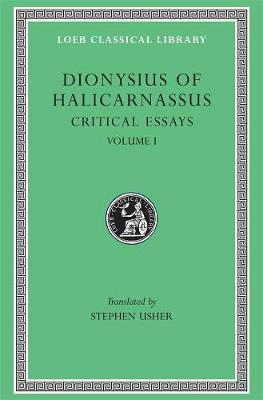Loeb Classical Library
1 primary work • 2 total works
Book 378
Dionysius of Halicarnassus was born before 53 BCE and went to Italy before 29 BCE. He taught rhetoric in Rome while studying the Latin language, collecting material for a history of Rome, and writing. His Roman Antiquities began to appear in 7 BCE. Dionysius states that his objects in writing history were to please lovers of noble deeds and to repay the benefits he had enjoyed in Rome. But he wrote also to reconcile Greeks to Roman rule. Of the 20 books of Roman Antiquities (from the earliest times to 264 BCE) we have the first 9 complete; most of 10 and 11; and later extracts and an epitome of the whole. Dionysius studied the best available literary sources (mainly annalistic and other historians) and possibly some public documents. His work and that of Livy are our only continuous and detailed independent narratives of early Roman history.
Dionysius was author also of essays on literature covering rhetoric, Greek oratory, Thucydides, and how to imitate the best models in literature.
The Loeb Classical Library publishes a two-volume edition of the critical essays; the edition of Roman Antiquities is in seven volumes.
No 465
Dionysius of Halicarnassus had migrated to Rome by 30 BCE, where he lived until his death some time after 8 BCE, writing his Roman Antiquities and teaching the art of rhetoric and literary composition.
Dionysius's purpose, both in his own work and in his teaching, was to re-establish the classical Attic standards of purity, invention and taste in order to reassert the primacy of Greek as the literary language of the Mediterranean world. He advocated the minute study of the styles of the finest prose authors of the fifth and fourth century BCE, especially the Attic orators. His critical essays on these and on the historian Thucydides represent an important development from the somewhat mechanical techniques of rhetorical handbooks to a more sensitive criticism of individual authors. Illustrating his analysis with well-chosen examples, Dionysius preserves a number of important fragments of Lysias and Isaeus.
The essays on those two orators and on Isocrates, Demosthenes and Thucydides comprise Volume I of this edition. Volume II contains three letters to his students; a short essay on the orator Dinarchus; and his finest work, the essay On Literary Composition, which combines rhetoric, grammar and criticism in a manner unique in ancient literature.
The Loeb Classical Library also publishes a seven volume edition of Roman Antiquities, by Dionysius of Halicarnassus, a history from earliest times to 264 BCE.

